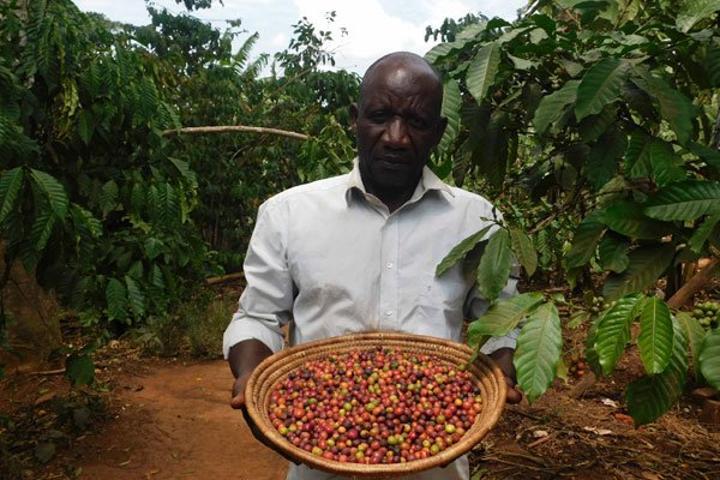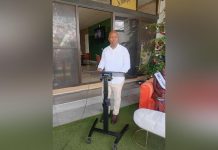Africa-Press – Lesotho. Fred Nsamba, 52, is well known in Masaka City, for his ground coffee packets which he carries around in a bag and sells to those that know about the irresistible flavour of his coffee. He also sells the ground coffee packets to grocery stores and restaurants.
Only a few people however seem to know that Nsamba is a coffee farmer at Mpugwe Village, Mukungwe Sub-county, Masaka District and that the coffee he sells i is harvested from his garden.
Nurtures dream “I was the last born in my family and I remember that we always drank homemade coffee. Both our parents were good coffee makers and they taught all of us the art of making good, strong, coffee which we drank,” he tells Seeds of Gold.
He remembers that only red ripe coffee cherries were picked and thoroughly dried under the sun. The husks would then be removed by pounding the dry coffee cherries in the traditional mortar with a pestle.
The coffee beans would then be separated and the beans would later be roasted on a traditional clay pan until they became brown. They would then be left to cool down before they would be put in a wooden mortar again and crushed into powder using a pestle.
It is a skill he acquired from his parents in childhood and it is now the source of his household’s income. When he left school, after Primary Seven, he became a brick maker.
He however, abandoned the occupation and became a second-hand clothes vendor. Vending second hand clothes enabled him to meet more people and to make friends in Masaka City since he had to move all over selling his goods.
“Remember right here in my home, I had continued with my parents’ practice of making and drinking our own coffee,” he revealed to Seeds of Gold. How he started
“Whenever I wanted to drink coffee in the restaurants I discovered it was either not there or whatever they had was never as good as the coffee I drank at home.
So I made it a point to take with me some of the coffee that I made at home and to donate it to the restaurants and some shopkeepers,” says Nsamba. To his pleasant surprise most of the people that tasted his coffee asked for more every time they saw him.
He soon became known as ‘the Kaawa man or musajja wa kaawa’ in Luganda. (Kaawa is the Luganda word for coffee. In Kiswahili coffee is known as kahawa.
) This was around 2005 and he realised that he was no longer earning as much money from second hand clothes as he used to. So an idea crossed his mind to begin demanding money from all those that enjoyed his coffee and asked for more.
He made a large amount of coffee, packed it in some polythene packs and took them to the shops and restaurants where he used to donate them before. To his surprise he sold all of them and this formed the beginning of his present occupation as a coffee seller.
Source of income Ground coffee making is now his household’s main economic activity and most important source of income. It supports his six children in school and his eldest child is a Business Administration student in Gulu University.
The others are attending Kaddugala Secondary School and Kaddugala Primary School. Construction of a new modern house for the family is also going on at his home which is a good sign that selling coffee is for him more paying than any other occupation that he has ever been engaged in.
He disclosed that from one gunny bag of dry coffee cherries a farmer these days earns about Shs250,000 but if it is processed it is possible to earn as much as Shs800,000.
Asked if constant traveling to sell his coffee in Masaka City does not take up too much of what should be his profits he answered, “All transport costs are negligible compared to what is earned as profit.
” Process To grind the roasted beans, he nowadays uses a manual grinding machine with the help of his wife. It is quite heavy and it requires a lot of physical energy to operate it.
“I once approached Masaka District Chairman who was by then Jude Mbabaali, and asked him to assist me to get a motorised grinding machine.
He referred me to the District Commercial Officer but he asked me to make a business plan and to go to a lawyer who would assist me to get registration as a company and then wait for help from the government, things I found quite difficult to understand.
So I left the matter at that,” says Nsamba. He insists that the coffee should be picked when it is fully ripe. He goes on to say that it should also be spread out on a clean mat or tarpaulin or cement floor for sun drying.
It should be thoroughly dried, up to moisture 12 or even 11. It should be free of any foreign objects. For best results roasting, according to Nsamba, should be done on a traditional clay pan.
For More News And Analysis About Lesotho Follow Africa-Press






